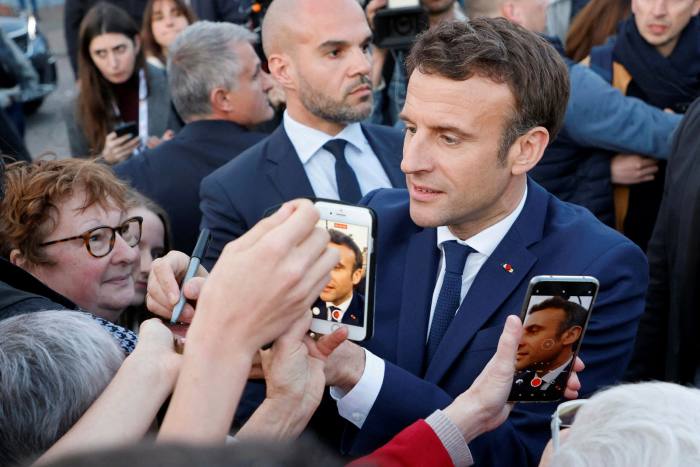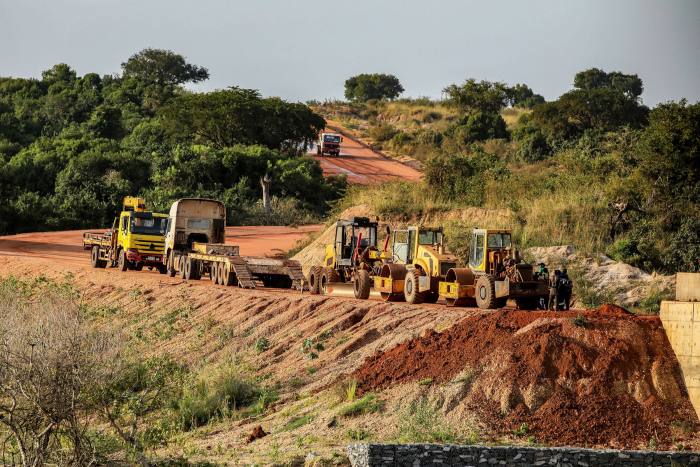Good morning. This article is an on-site version of our FirstFT newsletter. Sign up to our Asia, Europe/Africa or Americas edition to get it sent straight to your inbox every weekday morning
Ukraine’s finance minister has made an appeal for immediate financial support of tens of billions of dollars to plug a gaping fiscal deficit caused by the Russian invasion.
Government spending exceeded revenues by about $2.7bn in March and Ukraine expects the gap to expand to $5bn-$7bn a month in April and May because of the war. Ukraine’s gross domestic product was $164bn in 2021.
“We are under great stress, in the very worst [financial] condition,” Sergii Marchenko said in an interview with the Financial Times. “Now it is a question of the survival of our country. If you want us to continue fighting this war, to win this war . . . then help us.”
Marchenko painted a grim picture of the damage to Ukraine’s economy inflicted by Russia’s full-scale invasion in late February. Destruction to civilian and military infrastructure was estimated at $270bn, he said, with nearly 7,000 residential buildings damaged or destroyed.
More from Ukraine:
-
War crimes: The Netherlands has called on governments to increase their financial and political support for the International Criminal Court as it investigates alleged war crimes committed during Russia’s invasion of Ukraine.
-
Russian default: Moscow has vowed to sue if sanctions force it to default on its bonds but academics and lawyers have dismissed the threat as “payment theatre” designed to project the state’s financial strength.
-
Banking: Société Générale will take a €3.1bn hit after agreeing to exit Russia by selling Rosbank to an investment company founded by billionaire Vladimir Potanin.
-
Austria: Chancellor Karl Nehammer said he had “no positive impression” of his talks with Russian president Vladimir Putin, after a trip to Moscow yesterday to try to broker an end to the country’s invasion of Ukraine.
Thanks for reading FirstFT Europe/Africa. Have feedback on today’s newsletter? Send it to firstft@ft.com — George.
Five more stories in the news
1. Mélenchon the kingmaker Hours after he fell short of making it into the final stage of France’s presidential election, veteran leftist Jean-Luc Mélenchon told supporters they should not give “a single vote” to far-right candidate Marine Le Pen in the second round on April 24. The identity of France’s next president might depend on whether they listen.
-
Final sprint: Emmanuel Macron has started a frantic hunt for working-class votes in a bid to ensure victory in the France’s presidential election.
-
Opinion: We need to think about a Le Pen presidency, writes Gideon Rachman. The far-right candidate could win, plunging Nato and the EU into turmoil.

2. UK pays for targeted antibiotics The UK is set to become the first country to pay drug companies a fixed fee for supplying antibiotics in an effort to tackle the growing global crisis over resistance to the drugs. The aim is to give companies more incentive to develop new antibiotics, which would be held back to treat patients who really need them.
3. Torpedoing a shipping merger Alexander Saverys, an heir to one of Belgium’s oldest shipping dynasties, has hit out at Norwegian tycoon John Fredriksen’s ambition to create the world’s largest oil tanker group in a $4.2bn merger with the company founded by his family, vowing to build opposition to the plan.
4. US airlines and passengers at odds over masks Airline executives and politicians are piling on pressure for the US to let Covid-19 mask rules expire on schedule next week, even as most of the public wants to keep them. Forced mask-wearing was related to 72 per cent of a record 5,981 reports of unruly passengers in 2021.
5. Australia’s Morrison fights his own party Within hours of the Australian government announcing a “giveaway” budget that Scott Morrison had hoped would propel him to a second term as prime minister, his own party began tearing into him.
The day ahead
European data: The European Central Bank releases the first-quarter euro area bank lending survey. In the January survey, banks indicated a slight tightening of credit standards on loans to enterprises. Separately, France unveils February trade figures and Germany issues its March consumer price index data and the ZEW economic sentiment survey.
UK data The statistics office issues labour market statistics for April. Its most recent Labour Force Survey estimates for November 2021 to January 2022 showed a continuing recovery in the labour market.
Company results: The UK online clothes retailer Asos releases figures for the first half. In January, its shares jumped after it said it would move to the main market of the London Stock Exchange following 20 years on Aim. Deliveroo and JD Sports will publish trading updates.
Cosmonautics Day Today marks 61 years since Russia’s Yuri Gagarin conducted the first human space flight on April 12 1961.
India economic data February industrial production figures are due, as well as March’s consumer price index data.
What else we’re reading and listening to
Alarm over German inflation Like many Germans, Otmar Issing is alarmed by surging inflation and worried by the “misguided” response of the European Central Bank. As the ECB’s first chief economist and a founding father of the euro, Issing’s complaints carry more weight than those of most of his countrymen.
No dethroning the dollar Sanctions against Russia are built around denying Moscow access to foreign currencies, particularly the dollar. It should follow that countries wanting to avoid a similar fate would seek to diversify away from the US currency. There is a certain logic to that but the reality is the greenback can’t be avoided, writes Megan Greene.
Energy demand endangers species As one of the world’s most famous game reserves, Murchison Falls National Park is home to some of the largest populations of elephants, giraffes, lions and leopards. But life is about to encounter a new threat, as the $10bn Lake Albert oil project run by TotalEnergies and Cnooc roars into life.

JPMorgan after Jamie Dimon JPMorgan has offered a rare glimpse of its succession preparations in a securities filing that said a “substantial majority” of investors wanted Jamie Dimon to stay on as non-executive chair when he steps down as chief executive. If the jobs were split, it would go against the prevailing trend in corporate America.
Tech Tonic: Chips with everything In this week’s episode of the FT podcast, we take a detailed look into the semiconductor industry and Taiwan’s unique position as a bastion of computer-chip talent. James Kynge, global China editor, looks at the unintended consequences of the race for semiconductor dominance.
Your feedback
Thanks to readers who responded with their thoughts about John Lee entering the race to succeed Carrie Lam as Hong Kong’s next chief executive. Here’s what two FirstFT Asia readers in Asian financial centre had to say. (Both preferred to remain anonymous for safety reasons.)
“The celebration of getting rid of Carrie Lam was very shortlived when people saw who the replacement will be. It’s also worth noting that almost everyone I have spoken to in the international community are saying this will be an accelerator for them leaving Hong Kong.”
“As a longtime resident of Hong Kong, I am hardly surprised by this development. It is part of the Chinese Communist party’s ‘long game’ takeover of Hong Kong. The Party allowed the incompetent Carrie Lam to remain in charge and reduce one of the world’s great cities to a laughing stock.”
Thank you for reading and remember you can add FirstFT to myFT. You can also elect to receive a FirstFT push notification every morning on the app. Send your recommendations and feedback to firstft@ft.com. Sign up here


